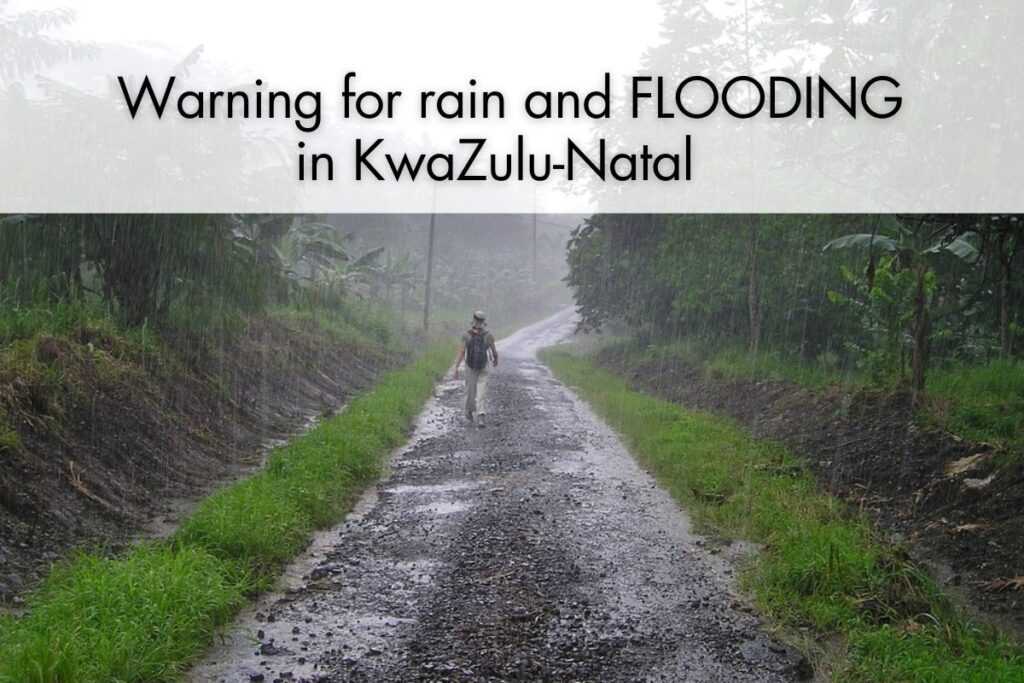The SA Weather Service (SAWS) has issued a weather warning for disruptive rain and floods in KwaZulu-Natal today, 19 May.
Warning for localised flooding
A yellow level 2 weather warning for disruptive rain, which will likely cause localised flooding of susceptible settlements, roads, low-lying areas, and bridges along the south coastal areas of KwaZulu-Natal was issued.
Consequently, various impacts are expected, including localised flooding of susceptible settlements, both informal and formal, along with the following impacts:
- The heavy rainfall may lead to the flooding of roads, causing potential disruptions and difficulties for motorists.
- Low-lying areas and bridges may experience localised flooding.
- The heavy rain can damage mud-based houses and makeshift structures.
- The rainfall may create slippery road surfaces.
- Flooding caused by the rainfall can lead to traffic disruptions, potentially causing delays and inconveniences for commuters.
HOW TO STAY SAFE DURING HEAVY RAIN
During extreme rainy weather, it is important to take every precaution to stay safe; here are a few tips.
- During storms, people living in low-lying areas must take special care as sudden floods might affect them.
- They should monitor the rising water levels and evacuate to a safer place or higher spot when the water level rises.
- Use other routes and do not cross through flooded roads or bridges.
- Avoid crossing low-lying bridges, streams, and rivers.
- Never try to walk, swim, or drive in swift-flowing water as it can sweep you off your feet.
- Motorists must be very careful and avoid driving through flooded areas.
- Drive to and park at safer areas.
- Monitor weather alerts on radio and television.
- Contact municipal disaster management centers, the nearest police station, or call the national emergency numbers (112, 10177, or 107) when faced with threats.
- Do not try to drive over a low-water bridge if water is flowing strongly across it and the ground is not visible.
- Teach children about the dangers of floods.
ALSO READ: King, Queen’s Cullinan diamond crowns irks SA tweeps [watch]
- Keep important documents in a water-resistant container.
- Keep cell phones in close proximity and have emergency numbers at hand.
- Be especially vigilant at night as it is harder to recognize potentially deadly road hazards.
- Do not camp or park cars along rivers or washes, especially during heavy rains or thunderstorms.
- If on foot, be aware that low moving water can also be dangerous during flood conditions.
- Do not walk into moving water.
“Communities are encouraged to try to avoid contact with any flood waters as it may be contaminated with raw sewage, oil, or other dangerous substances and may also be charged with electricity from fallen power lines.” the statement by the Department of Cooperative Governance and Traditional Affairs concluded.
CLICK HERE TO READ MORE ARTICLES BY MICHELLE SWART
HOW TO STAY SAFE DURING HEAVY RAIN
During extreme rainy weather, it is important to take every precaution to stay safe; here are a few tips.
- During storms, people living in low-lying areas must take special care as sudden floods might affect them.
- They should monitor the rising water levels and evacuate to a safer place or higher spot when the water level rises.
- Use other routes and do not cross through flooded roads or bridges.
- Avoid crossing low-lying bridges, streams, and rivers.
- Never try to walk, swim, or drive in swift-flowing water as it can sweep you off your feet.
- Motorists must be very careful and avoid driving through flooded areas.
- Drive to and park at safer areas.
- Monitor weather alerts on radio and television.
- Contact municipal disaster management centers, the nearest police station, or call the national emergency numbers (112, 10177, or 107) when faced with threats.
- Do not try to drive over a low-water bridge if water is flowing strongly across it and the ground is not visible.
- Teach children about the dangers of floods.
ALSO READ: LOOK: Passengers jump out of moving taxi after it burst into flames
- Keep important documents in a water-resistant container.
- Keep cell phones in close proximity and have emergency numbers at hand.
- Be especially vigilant at night as it is harder to recognize potentially deadly road hazards.
- Do not camp or park cars along rivers or washes, especially during heavy rains or thunderstorms.
- If on foot, be aware that low moving water can also be dangerous during flood conditions.
- Do not walk into moving water.
“Communities are encouraged to try to avoid contact with any flood waters as it may be contaminated with raw sewage, oil, or other dangerous substances and may also be charged with electricity from fallen power lines.” the statement by the Department of Cooperative Governance and Traditional Affairs concluded.
CLICK HERE TO READ MORE ARTICLES BY MICHELLE SWART

